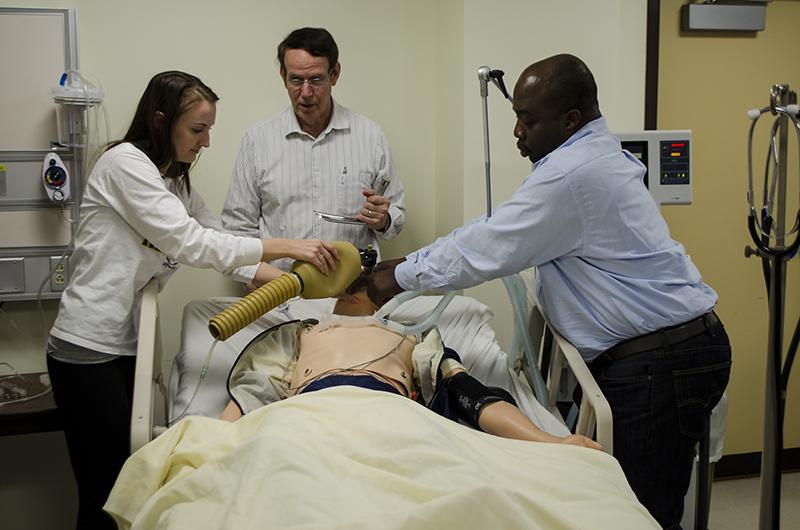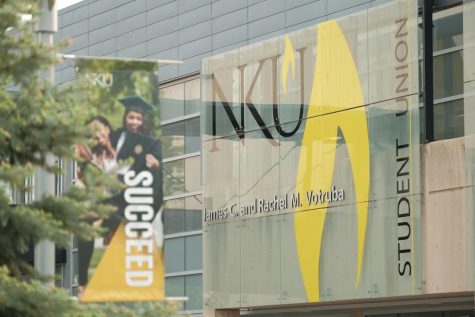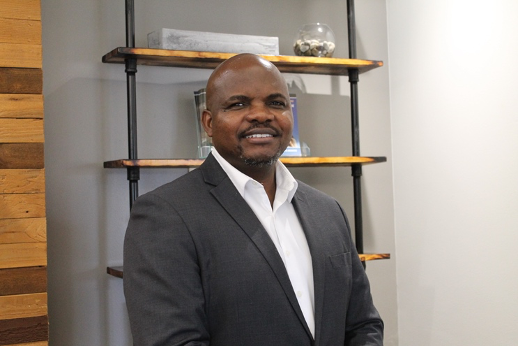NKU to receive new degrees in upcoming fall semester
Allie Volpenhein (left), Bob Langenderfer (center), Atsou Koumi (right) practice resuscitation on a dummy.
The college of health professions will be offering two new degrees in the fall of 2014, a bachelor’s degree in radiologic science and bachelor’s degree in respiratory therapy.
NKU is among the first state funded universities in Kentucky to offer a bachelor’s degree in respiratory therapy. Bellarmine University, a private institution in Louisville, first offered the degree in 2001 according to Bellarmine’s Director of Media Relations Jason Cissell.
The degrees are transitioning from associate’s programs to bachelor’s degrees. Previously, radiologic technology and respiratory therapy students who wanted a bachelor’s degree had the option of getting a bachelor’s in health science degree. Now respiratory therapy and radiologic science students can complete a four-year degree within their major.
Radiologic Science Degree
NKU’s bachelor’s degree in radiologic science is a professional degree that involves the use of radiation to produce images of the human body. Images can consist of organs, tissues, bones and vessels in the body. These images are then used by healthcare providers to help diagnose and treat illnesses.
Diane Gronefeld, director for the radiologic science degree, said the new bachelor’s program will help allow students to move on to more advanced aspects of radiology. The extra year will allow students to take more advanced imaging courses and gain more experience.
“We’re hoping that students will be more prepared to move into those advanced imaging roles if they open up at the hospital,” Gronefeld said.
Other career possibilities that this degree can open up are management opportunities and sales representative careers for graduates of the program, said Karen Leek, the clinical coordinator and radiologic science degree faculty member.
Another potential job that Gronefeld mentioned was an application specialist, who demos new radiology equipment.
“You have to think outside the box sometimes when it comes to the job market today,” Leek said.
The new program can also allow students to move on to complete a master’s degree and get an information technology or health informatics position, Leek said. Teaching is another possible career opportunity if a student moves on to a master’s program.
“It’s preparing our students to move on with their education,” Gronefeld said. “We’re really excited about that.”
Some challenges associated with getting this program underway include the limited on-site clinical space and the short amount of faculty, according to Gronefeld. The small amount of faculty and limited space clinical means that only one group of students can be taken on as opposed to two.
“We can only put so many students at each hospital,” Gronefeld said.
Leek said that there is going to challenges, “but it’s nothing that they can’t overcome.”
Gronefeld said it was also a challenge to get the dean on board since there will be a year of no graduates now that associates program is being phased out.
The application deadline for the radiologic science degree was February 17. According to Gronefeld, 24 students will be accepted into the program in fall. As of last Friday, almost 50 applications had been received.
“I think it’s something that we need out there,” Leek said. “Anything we can to do promote professionalism is a positive thing for all health professions.”
Respiratory Therapy Degree
The new bachelor’s in respiratory therapy prepares graduates to care for patients with chronic breathing deficiencies. Some of these deficiencies include asthma, emphysema and lung cancer. Respiratory therapy graduates care for these patients under the direction of a physician and help make patient welfare decisions.
Deb Kasel, the director of the new bachelor’s program in respiratory therapy, is excited to be the first the institution in the region with a dedicated respiratory care bachelor’s degree.
“The wave of the future,” Kasel said. “Most of the hospitals in this region want baccalaureate prepared therapists.”
According to Kasel, some of hospitals are even requiring their existing employees to return to school and get their bachelor’s degree. With the evolving field of health care more and more hospitals are wanting the bedside clinician to not only care for the patient, but they want them to make decisions using research and evidence.
Kasel said that these practices are best taught over a longer time versus a two year program because the students get a chance to practice and hone in the skills repeatedly.
“We’ll be producing graduates that meet regional employer’s needs,” Kasel said.
Career opportunities that are open for a graduate with a bachelor’s degree in respiratory care as opposed to an associate’s degree include management and supervisor roles, according to Kasel.
Additionally, this degree can allow students to explore positions in areas such as sales, marketing, research and teaching.
The biggest challenge that came with getting this degree was getting the regional employers on board, Kasel said. After they were on board getting the degree wasn’t a problem.
Kasel said she has been wanting a bachelor’s program for “a good ten plus years.”
With focused effort over the past few years, the program was able to transition to a bachelor’s degree.
Applications are still being accepted for the new bachelor’s program. According to Kasel, 16 to 20 students will still be accepted in the first year. After that, 20 students will be accepted annually.
These two new degrees will follow recent implementation of the new degree this semester. The college of health professions introduced the master of science in health science degree. The degree is a fully online graduate program.












